Make this year your most musical year yet with these excellent new year’s resolutions for learning guitar for beginners by guitar teacher Kirk R.…
Pick Up Your Guitar Everyday
To some this may seem daunting, and to others it might sound obvious.
Regardless of which side of that you’re on, getting your hands on your guitar often is an important step in learning, especially when you’re just starting out.
This is true in most other areas of study as well, but if you’re learning to walk or learning a language, you have to tools to practice it with you at all times.
As a side note here, you can also make lots of progress doing what I call mental practice. The idea is just that you use your analytical and visualization skills to solve problems with your playing without ever picking up your instrument. There are many ways to go about that, but I’ll leave that for a future post!
Picking up your guitar often allows your body and mind to create a sense of normalcy while you’re playing. When you want to walk somewhere, you probably don’t think about which joints of your legs need to bend and at exactly what time, you just begin walking. Guitar can be much the same!
You don’t have to plan long practice sessions everyday. Usually just picking it up and playing through something that you’re working on is enough. If it’s a busy day, it might be only a few minutes, and that’s ok.
If you have more time, but not all at once, try a few minutes before school or work and then again between dinner and bed.
Figure out what works in your schedule and make it a part of your day!
Check out: 50 Little Things You Can Do To Get More From Your Guitar Practice Time
Practice With a Metronome
Aside from an instrument, the metronome is the most helpful item that a musician can have. If you don’t have one already, they can be found very cheaply. Though I have a few, I most commonly use a metronome app that I downloaded for free.
Metronomes can be frustrating little devices, but they will make you a better player. It’s important to remember that they often work like a mirror. If you’re noticing mistakes when you play with a metronome that you didn’t notice before, chances are, you were already making it (or a similar mistake).
When you see more mistakes than before, it may seem like you are suddenly less skilled than you thought yourself before, but remember, when you notice mistakes you’re making, you can immediately start working to correct them!
Start slowly (slower than you think you need to) and work up to your desired speed a notch or two at a time. This might seem tedious, but it’s a great way to work up to fast speeds in no time.
Rhythm is one of the most important aspects of your playing (even more than hitting the right notes!) so if you want to build your skills, a device that helps to keep your rhythm accurate is indispensable.
Check out: 13 Guitar Apps We Can’t Live Without
Learn a Song in a New Style or Genre
I’m not suggesting here that you become a jack of all trades sort of musician. I’ve seen many of them over the years, and it seems like very few of them have mastered all, or any, of the styles that they’re playing. What I am saying is learn something in a different style so that you can look at the music that you really want to play with a new and wider perspective.
I once spent some time studying with a guy who was experienced in Brazilian choro guitar. He looked at the music that I was already playing at the time very differently than I did.
His whole approach was totally different and it forced me to take note of things in the music that I had never payed any attention to before.
It’s that sort of experience that will make you a better musician in the long run. If you play mostly rock now, try something classical; learning jazz? Try playing metal.
Maybe something less contrasting. If you play folk from tab, try playing folk from sheet music. If you’re used to reading sheet music, try playing from a lead sheet/chord chart.
Forcing yourself out of your comfort zone will not only make you a more versatile player, but it will help you improve the way that you play your usual music.
Check out: The Big List of Easy Guitar Songs
Set Goals
Set one goal that seems impossible now and one that you know you can accomplish
No matter what kind of successful person you talk to, they will all agree that setting goals is helpful. This is a simple suggestion, but it can take a variety of forms.
The important part of this suggestion is to have something that you can keep you eye on for a long time; something that keeps driving you forward, as well as something that is totally achievable and reminds you that you’re making progress.
The “reach goal” could be something like a difficult song that you want to learn, or to memorize a certain number of songs.
For the easier goal, maybe it’s making a change between two specific chords, playing in front of someone once a month, or to get a song that you’re already learning up to a certain tempo.
Whatever you choose for your goals, make sure that they are measureable. If you want to get a song up to a certain tempo, make sure that the tempo is specific: 136 bpm instead of ‘fast’.
Check out: How to Learn Guitar: Setting Goals, Staying Motivated, and More!
Add Guitar Exercises to Your Practice Routine
This may not seem as exciting as your usual guitar practice, but I would argue that given the right mindset and exercise, it can be as interesting and engaging as practicing music.
It might come as a surprise to some (though perhaps I’m wrong) that I’m making a distinction between music and exercises.
It’s important to play inherently non-musical exercises, though there is value in exercise-like pieces of music as well. The reason for this is that the goal of an exercise is one of physical movement on the instrument.
In order to carefully work on this aspect of playing, we have to take the emotion and desire to make our playing sound a certain way out of the equation.
Have you ever noticed that when you start to learn a song that you have often listened to, you usually start playing faster than your hands can really keep up? It’s because you’re used to hearing it a certain way, and your brain is telling your hands to play the way it thinks the song should sound.
When you’re using a non-musical exercise to develop skills in your fingers, you don’t have the same sort of drive as learning a song, even one you haven’t heard before.
There are probably millions of exercises that you can choose from, but don’t be overwhelmed.
Find one that addresses an aspect of your playing that you want to improve. Treat this exercise like weight lifting. First, make sure it’s of reasonable difficulty. You don’t walk into a gym the first day and start lifting the heaviest weights available.
Second, when you are comfortable playing through the exercise while focusing on the technical aspects and they all come out as you want them to, don’t abandon the exercise! It’s not meant to be a badge that you earn and display. It’s a regular tool that you use to keep your chops in shape.
Once a weight lifter lifts the heaviest weight available, they don’t stop lifting it, but they keep coming back to it, perhaps adding more reps, or just using it to maintain their current abilities.
Check out: 3 Simple Guitar Exercises You’ll Never Outgrow
Did you make any musical resolutions this year? Share them with us in the comments below!
 Post Author: Kirk R.
Post Author: Kirk R.Kirk is a classical, bass, and acoustic guitar instructor in Denver, CO. He earned a bachelors of music in Guitar performance at The College-Conservatory of Music in Cincinnati and he is currently pursuing a masters degree in performance. Learn more about Kirk here!
Megan L.







